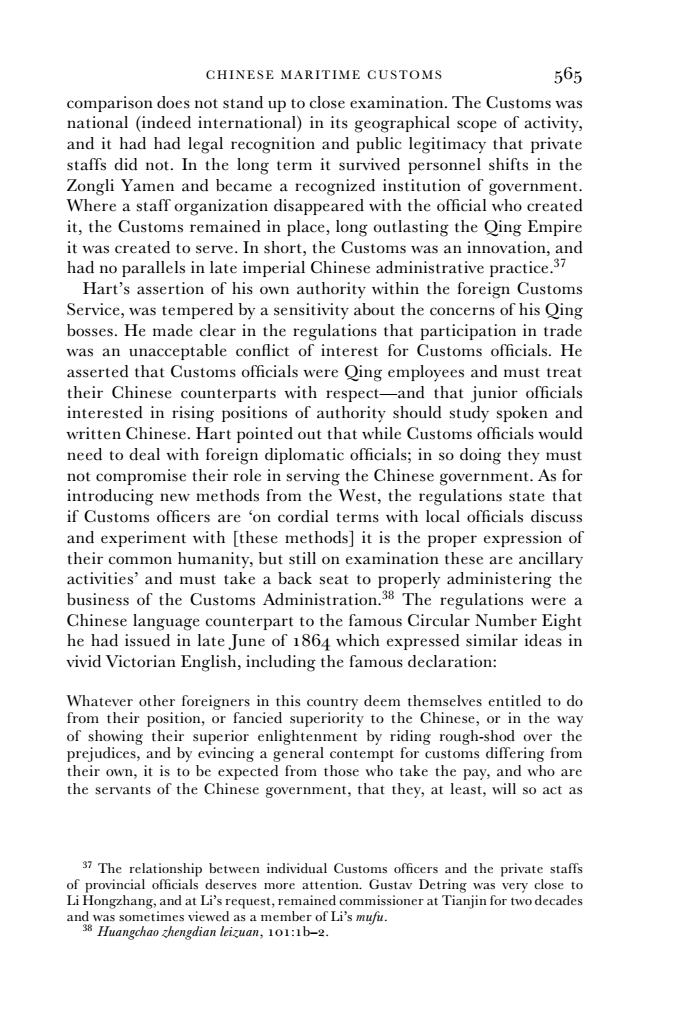正在加载图片...

CHINESE MARITIME CUSTOMS 565 comparison does not stand up to close examination.The Customs was national (indeed international)in its geographical scope of activity, and it had had legal recognition and public legitimacy that private staffs did not.In the long term it survived personnel shifts in the Zongli Yamen and became a recognized institution of government. Where a staff organization disappeared with the official who created it,the Customs remained in place,long outlasting the Qing Empire it was created to serve.In short,the Customs was an innovation,and had no parallels in late imperial Chinese administrative practice.37 Hart's assertion of his own authority within the foreign Customs Service,was tempered by a sensitivity about the concerns of his Qing bosses.He made clear in the regulations that participation in trade was an unacceptable conflict of interest for Customs officials.He asserted that Customs officials were Qing employees and must treat their Chinese counterparts with respect-and that junior officials interested in rising positions of authority should study spoken and written Chinese.Hart pointed out that while Customs officials would need to deal with foreign diplomatic officials;in so doing they must not compromise their role in serving the Chinese government.As for introducing new methods from the West,the regulations state that if Customs officers are 'on cordial terms with local officials discuss and experiment with [these methods]it is the proper expression of their common humanity,but still on examination these are ancillary activities'and must take a back seat to properly administering the business of the Customs Administration.38 The regulations were a Chinese language counterpart to the famous Circular Number Eight he had issued in late June of 1864 which expressed similar ideas in vivid Victorian English,including the famous declaration: Whatever other foreigners in this country deem themselves entitled to do from their position,or fancied superiority to the Chinese,or in the way of showing their superior enlightenment by riding rough-shod over the prejudices,and by evincing a general contempt for customs differing from their own,it is to be expected from those who take the pay,and who are the servants of the Chinese government,that they,at least,will so act as 37 The relationship between individual Customs officers and the private staffs of provincial officials deserves more attention.Gustav Detring was very close to Li Hongzhang,and at Li's request,remained commissioner at Tianjin for two decades and was sometimes viewed as a member of Li's mufu. 38 Huangchao zhengdian leizuan,101:1b-2.CHINESE MARITIME CUSTOMS 565 comparison does not stand up to close examination. The Customs was national (indeed international) in its geographical scope of activity, and it had had legal recognition and public legitimacy that private staffs did not. In the long term it survived personnel shifts in the Zongli Yamen and became a recognized institution of government. Where a staff organization disappeared with the official who created it, the Customs remained in place, long outlasting the Qing Empire it was created to serve. In short, the Customs was an innovation, and had no parallels in late imperial Chinese administrative practice.37 Hart’s assertion of his own authority within the foreign Customs Service, was tempered by a sensitivity about the concerns of his Qing bosses. He made clear in the regulations that participation in trade was an unacceptable conflict of interest for Customs officials. He asserted that Customs officials were Qing employees and must treat their Chinese counterparts with respect—and that junior officials interested in rising positions of authority should study spoken and written Chinese. Hart pointed out that while Customs officials would need to deal with foreign diplomatic officials; in so doing they must not compromise their role in serving the Chinese government. As for introducing new methods from the West, the regulations state that if Customs officers are ‘on cordial terms with local officials discuss and experiment with [these methods] it is the proper expression of their common humanity, but still on examination these are ancillary activities’ and must take a back seat to properly administering the business of the Customs Administration.38 The regulations were a Chinese language counterpart to the famous Circular Number Eight he had issued in late June of 1864 which expressed similar ideas in vivid Victorian English, including the famous declaration: Whatever other foreigners in this country deem themselves entitled to do from their position, or fancied superiority to the Chinese, or in the way of showing their superior enlightenment by riding rough-shod over the prejudices, and by evincing a general contempt for customs differing from their own, it is to be expected from those who take the pay, and who are the servants of the Chinese government, that they, at least, will so act as 37 The relationship between individual Customs officers and the private staffs of provincial officials deserves more attention. Gustav Detring was very close to Li Hongzhang, and at Li’s request, remained commissioner at Tianjin for two decades and was sometimes viewed as a member of Li’s mufu. 38 Huangchao zhengdian leizuan, 101:1b–2